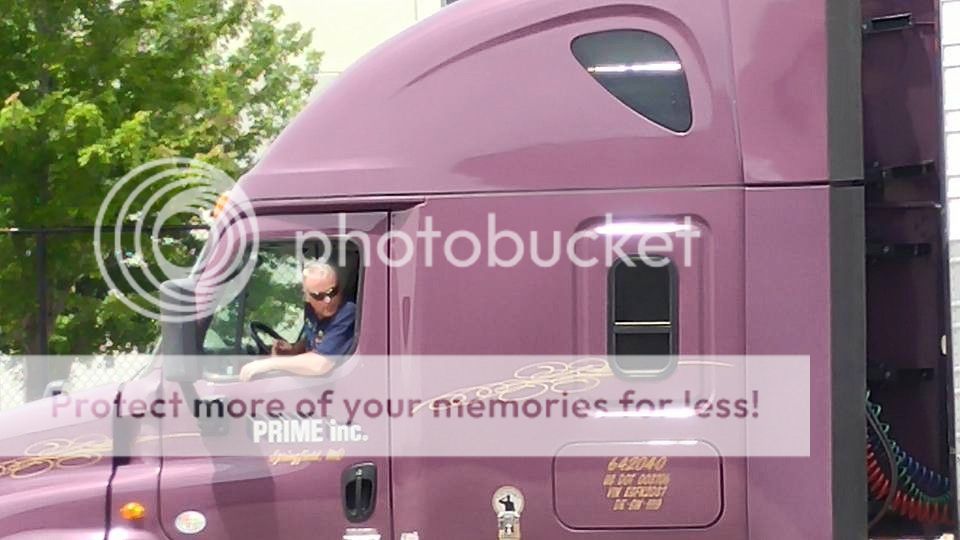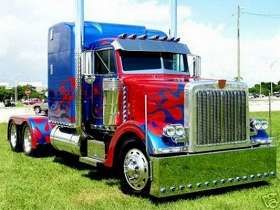Looking For A New Career.
Topic 8797 | Page 1
Hey, Daniel, you came to the right place. All the stuff here is no-charge free. First thing you need to do is look at what's available at the top of the page. Poke around a bit.
Be sure to start off with a look at the Truck Driver's Career Guide. If you want, the Trucking Truth founder, Brett, wrote a book available online (yup, $0.00 cost.) It's Brett's Book.
If you play your cards right, like I and many others did, you could get all (I said all) your training and practice for free. You still need to pay for your state license fee and the official DOT physical.
Cruise this here forum, see what people did in their driving classes. Go to the General Discussion for more of the OTR life.
Finally (there's much more, and you'll find it) here's how to answer your question about Company-Sponsored Training . This'll help, too: How To Choose A School.
Keep asking questions. Many here love to help out.
CDL:
Commercial Driver's License (CDL)
A CDL is required to drive any of the following vehicles:
- Any combination of vehicles with a gross combined weight rating (GCWR) of 26,001 or more pounds, providing the gross vehicle weight rating (GVWR) of the vehicle being towed is in excess of 10,000 pounds.
- Any single vehicle with a GVWR of 26,001 or more pounds, or any such vehicle towing another not in excess of 10,000 pounds.
- Any vehicle, regardless of size, designed to transport 16 or more persons, including the driver.
- Any vehicle required by federal regulations to be placarded while transporting hazardous materials.
OTR:
Over The Road
OTR driving normally means you'll be hauling freight to various customers throughout your company's hauling region. It often entails being gone from home for two to three weeks at a time.
DOT:
Department Of Transportation
A department of the federal executive branch responsible for the national highways and for railroad and airline safety. It also manages Amtrak, the national railroad system, and the Coast Guard.
State and Federal DOT Officers are responsible for commercial vehicle enforcement. "The truck police" you could call them.
Company-sponsored Training:
A Company-Sponsored Training Program is a school that is owned and operated by a trucking company.
The schooling often requires little or no money up front. Instead of paying up-front tuition you will sign an agreement to work for the company for a specified amount of time after graduation, usually around a year, at a slightly lower rate of pay in order to pay for the training.
If you choose to quit working for the company before your year is up, they will normally require you to pay back a prorated amount of money for the schooling. The amount you pay back will be comparable to what you would have paid if you went to an independently owned school.
Company-sponsored training can be an excellent way to get your career underway if you can't afford the tuition up front for private schooling.
OOS:
When a violation by either a driver or company is confirmed, an out-of-service order removes either the driver or the vehicle from the roadway until the violation is corrected.

Hey, Daniel, you came to the right place. All the stuff here is no-charge free. First thing you need to do is look at what's available at the top of the page. Poke around a bit.
Be sure to start off with a look at the Truck Driver's Career Guide. If you want, the Trucking Truth founder, Brett, wrote a book available online (yup, $0.00 cost.) It's Brett's Book.
If you play your cards right, like I and many others did, you could get all (I said all) your training and practice for free. You still need to pay for your state license fee and the official DOT physical.
Cruise this here forum, see what people did in their driving classes. Go to the General Discussion for more of the OTR life.
Finally (there's much more, and you'll find it) here's how to answer your question about Company-Sponsored Training . This'll help, too: How To Choose A School.
Keep asking questions. Many here love to help out.
Go through the High Road training program on here too, It really is amazing. If you go through it the cdl written test will be easy. Much more there too. Good luck
CDL:
Commercial Driver's License (CDL)
A CDL is required to drive any of the following vehicles:
- Any combination of vehicles with a gross combined weight rating (GCWR) of 26,001 or more pounds, providing the gross vehicle weight rating (GVWR) of the vehicle being towed is in excess of 10,000 pounds.
- Any single vehicle with a GVWR of 26,001 or more pounds, or any such vehicle towing another not in excess of 10,000 pounds.
- Any vehicle, regardless of size, designed to transport 16 or more persons, including the driver.
- Any vehicle required by federal regulations to be placarded while transporting hazardous materials.
OTR:
Over The Road
OTR driving normally means you'll be hauling freight to various customers throughout your company's hauling region. It often entails being gone from home for two to three weeks at a time.
DOT:
Department Of Transportation
A department of the federal executive branch responsible for the national highways and for railroad and airline safety. It also manages Amtrak, the national railroad system, and the Coast Guard.
State and Federal DOT Officers are responsible for commercial vehicle enforcement. "The truck police" you could call them.
Company-sponsored Training:
A Company-Sponsored Training Program is a school that is owned and operated by a trucking company.
The schooling often requires little or no money up front. Instead of paying up-front tuition you will sign an agreement to work for the company for a specified amount of time after graduation, usually around a year, at a slightly lower rate of pay in order to pay for the training.
If you choose to quit working for the company before your year is up, they will normally require you to pay back a prorated amount of money for the schooling. The amount you pay back will be comparable to what you would have paid if you went to an independently owned school.
Company-sponsored training can be an excellent way to get your career underway if you can't afford the tuition up front for private schooling.
OOS:
When a violation by either a driver or company is confirmed, an out-of-service order removes either the driver or the vehicle from the roadway until the violation is corrected.

Thanks Errol and Ricky,Brett's book was very helpful.having read it now I really think otr is the way I'm gonna go.I'm really glad I found this site.
OTR:
Over The Road
OTR driving normally means you'll be hauling freight to various customers throughout your company's hauling region. It often entails being gone from home for two to three weeks at a time.

Thanks Errol and Ricky,Brett's book was very helpful.having read it now I really think otris the way I'm gonna go.I'm really glad I found this site.
If it weren't for the information I've gained from Trucking Truth (Brett, Errol, and all of the other excellent representatives of the trucking industry), it would have been much more difficult to make it through CDL school. And through 6 days on the road!
One more thing to add (from personal experience) is when you do begin training for your CDL, learn as much as you can every moment. I've only been driving for 6 days and at least once I've experienced most every situation I learned about while in training. Slide the trailer axles, utilize the engine brake properly, get the most out of cruise control (especially in the orange trucks ....), back inside of tight places including blind-side set ups (little room for the tractor while you steer the trailer into an even smaller place that you literally cannot see without getting out to look), coupling/uncoupling, paperwork, time management (especially in the hours you can work each day as mandated by the DOT rules, and log books (although it will be most likely on a computer, but the same concept).
Get the most out of every moment. Then, when suddenly the situation calls for it, the time you spent in training will enable you to rise to the occasion!
CDL:
Commercial Driver's License (CDL)
A CDL is required to drive any of the following vehicles:
- Any combination of vehicles with a gross combined weight rating (GCWR) of 26,001 or more pounds, providing the gross vehicle weight rating (GVWR) of the vehicle being towed is in excess of 10,000 pounds.
- Any single vehicle with a GVWR of 26,001 or more pounds, or any such vehicle towing another not in excess of 10,000 pounds.
- Any vehicle, regardless of size, designed to transport 16 or more persons, including the driver.
- Any vehicle required by federal regulations to be placarded while transporting hazardous materials.
OTR:
Over The Road
OTR driving normally means you'll be hauling freight to various customers throughout your company's hauling region. It often entails being gone from home for two to three weeks at a time.
DOT:
Department Of Transportation
A department of the federal executive branch responsible for the national highways and for railroad and airline safety. It also manages Amtrak, the national railroad system, and the Coast Guard.
State and Federal DOT Officers are responsible for commercial vehicle enforcement. "The truck police" you could call them.
New Reply:
New! Check out our help videos for a better understanding of our forum features

















Preview:








 TT On Facebook
TT On Facebook
Hi my name is daniel. I'm from alabama, not a trucker or enrolled in a school yet but I'm very interested in a trucking career and that's what brought me to this page.not a man with much money so I have a question for you experienced drivers out there,which company sponsored school would be the best and closest to me.